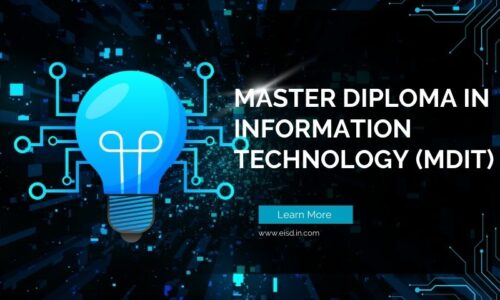Master Diploma in Information Technology (MDIT)
The digital era requires professionals with advanced knowledge in IT, software development, networking, data analytics, and cybersecurity. Our Master Diploma in Information Technology (MDIT) is designed to provide students, IT professionals, and technology enthusiasts with the knowledge and practical skills needed to excel in information technology careers. This program prepares learners for high-demand roles in IT management, software development, networking, data analytics, and cybersecurity.
Each subject in this master’s program carries 100 marks, combining theoretical concepts with hands-on practical learning. By completing this course, students gain the ability to manage IT systems, develop software, analyze data, secure networks, and implement modern web and multimedia solutions.
Why Enroll in the Master Diploma in Information Technology (MDIT)?
Industry-Relevant Curriculum
The course covers all critical aspects of IT, including computer fundamentals, programming, networking, software development, data analytics, database management, web technologies, multimedia, and cybersecurity.Hands-On Practical Training
Students engage in real-world projects, coding exercises, network configurations, and cybersecurity simulations to gain practical experience.Expert Faculty
Our instructors are experienced IT professionals providing guidance, mentorship, and insights into current trends and technologies.Certification for Career Growth
The MDIT certification validates your expertise in IT and digital technologies, enhancing employability in IT, networking, software development, and data analytics roles.Flexible Learning Options
We offer online and offline classes with flexible schedules to accommodate students and working professionals
Course Subjects – Comprehensive Learning Modules
The Master Diploma in Information Technology (MDIT) consists of nine core modules, each carrying 100 marks. The curriculum provides technical knowledge, practical skills, and professional expertise required for success in the IT industry.
1. Computer Fundamentals (100 Marks)
Understanding computer fundamentals is essential for all IT professionals.
Topics include:
Basics of computer hardware and software
Operating systems and system utilities
File management and storage systems
2. Programming (100 Marks)
Programming skills are critical for developing software solutions.
Topics include:
Introduction to programming languages
Object-oriented and functional programming
Writing efficient and structured code
3. Computer Networks (100 Marks)
Networking knowledge is vital for IT infrastructure and connectivity.
Topics include:
Networking fundamentals and protocols
LAN, WAN, and wireless network configuration
Network devices such as routers, switches, and access points
4. Software Development (100 Marks)
Software development enables students to create efficient applications.
Topics include:
Software development life cycle (SDLC)
Application design, coding, and implementation
Testing, debugging, and maintenance
5. Data Analytics (100 Marks)
Data analytics helps in making data-driven decisions.
Topics include:
Data collection, cleaning, and visualization
Statistical analysis and predictive modeling
Tools for data analytics like Python, R, and Excel
6. Database Management (100 Marks)
Database management is crucial for organizing and accessing information efficiently.
Topics include:
Introduction to relational and non-relational databases
SQL and database querying techniques
Data modeling, normalization, and indexing
7. Web Technologies (100 Marks)
Web technologies are essential for creating online applications and websites.
Topics include:
HTML, CSS, JavaScript fundamentals
Front-end and back-end development frameworks
Web application deployment and optimization
8. Multimedia (100 Marks)
Multimedia skills enable creation of rich digital content.
Topics include:
Digital graphics, video, and audio editing
Animation and interactive content creation
Multimedia software tools like Photoshop, Illustrator, and After Effects
9. Cybersecurity (100 Marks)
Cybersecurity ensures safe and reliable IT systems.
Topics include:
Cyber threats, vulnerabilities, and risk management
Security protocols, encryption, and authentication
Network and system security practices
Conclusion
The Master Diploma in Information Technology (MDIT) is a comprehensive program that prepares students for advanced careers in IT, software development, networking, data analytics, web technologies, and cybersecurity. Covering subjects such as Computer Fundamentals, Programming, Computer Networks, Software Development, Data Analytics, Database Management, Web Technologies, Multimedia, and Cybersecurity, this course provides the technical knowledge, practical skills, and industry-ready expertise required to succeed in the modern IT industry.
For enrollment details, batch schedules, and fee information, visit our website or contact our support team. Build your IT career with the Master Diploma in Information Technology (MDIT) and become a skilled professional ready to excel in the digital and technology-driven world.
Instructor
I recently completed the Master Diploma in Information Technology (MDIT), and it was a highly rewarding program for advancing my IT skills. The course covers computer fundamentals, programming languages, database management, networking, web development, software applications, and advanced IT tools. It provides a perfect combination of theoretical knowledge and practical training, preparing students for real-world IT challenges.
Gunjan

I recently completed the Master Diploma in Information Technology (MDIT), and it was a highly rewarding program for advancing my IT skills. The course covers computer fundamentals, programming languages, database management, networking, web development, software applications, and advanced IT tools. It provides a perfect combination of theoretical knowledge and practical training, preparing students for real-world IT challenges.
Gunjan
